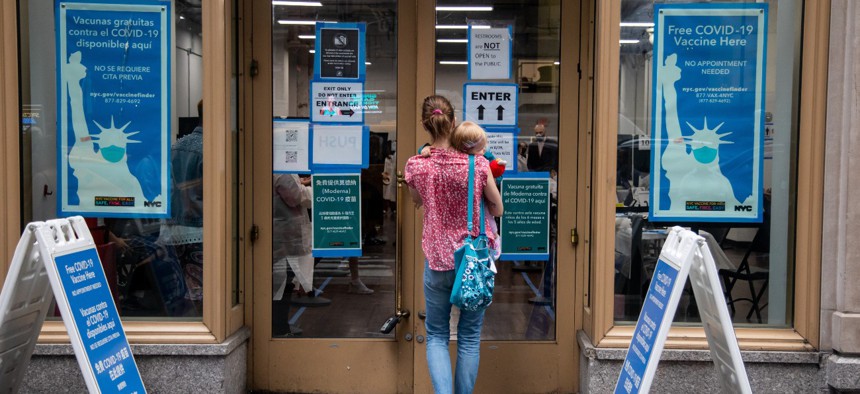
A child is carried into a COVID-19 vaccination site in New York City’s Times Square on June 22. Federal workers may use administrative leave to take their children to be vaccinated. Michael Nagle/Xinhua via Getty Images
COVID Leave for Kids’ Vaccinations, and More
A weekly roundup of pay and benefits news.
The Office of Personnel Management announced last week that, now that the Food and Drug Administration has authorized COVID-19 vaccines for small children, federal workers can now be granted administrative leave to take their youngest family members to get vaccinated.
OPM previously granted paid administrative leave to all federal workers to go get vaccinated and to take family members to do the same. That leave included the ability to take paid time off to deal with any symptoms or other side effects that may occur as a result of getting the shot.
In a memo to agency heads last week, OPM Director Kiran Ahuja reminded officials that they now must do the same so that federal workers can get their children vaccinated.
“Based on President Biden’s continued direction that the federal government should work aggressively to maximize the number of people receiving the COVID-19 vaccination, the Safer Federal Workforce Task Force previously issued guidance directing federal agencies to grant administrative leave so that federal employees may accompany their children whoa re getting a COVID-19 vaccine,” she wrote. “This guidance now applies to employees with children ages six months through 5 years, since those children are vaccine eligible. OPM encourages agencies to make sure employees are aware of this policy through outreach to their workforce.”
This leave policy now applies to employees with biological, adopted, step or foster children of federal employees between six months and 5 years old, as well as to legal wards and the children of an employee’s spouse or domestic partner.
Ahuja also reminded agencies that the administrative leave policy also applies in cases when a federal worker is accompanying a family member to receive a booster shot, provided they are eligible to receive it.
Appropriations Bill Advances with Eye on Retirement Processing
A House panel last week voted to advance the appropriations bill that serves as the vehicle for a federal employee pay raise and that governs the Office of Personnel Management.
Following last week’s markup in the House Appropriations Committee, the fiscal 2023 Financial Services and General Government appropriations bill still contains no mention of federal compensation, effectively endorsing President Biden’s plan to give federal employees an average 4.6% pay raise in 2023. That figure would mark the biggest raise for federal workers in nearly two decades but falls short of requests from federal employee groups and some Democratic lawmakers, who have rallied around the prospect of a 5.1% average increase in 2023.
But at the request of the National Active and Retired Federal Employees Association, the committee’s report on the legislation now includes language demanding that OPM keep Congress informed on its efforts to improve its processing of federal employees’ retirement claims when they leave federal service.
“The committee is concerned with the lengthy delays to process retirement and survivor claims and update health insurance benefits, as well as other critical changes that impact retirement benefits,” the report states. “These delays cause hardships for federal annuitants and their families. OPM is directed to brief the committee quarterly on OPM’s efforts and progress to reduce these delays.”
Modernizing the process by which OPM processes federal employee retirement claims has long been on the agency’s to-do list. But the COVID-19 pandemic, and measures required to protect employees’ health and safety, has been a significant roadblock in efforts to digitize retirement records, which are largely stored on paper in a bunker in Pennsylvania.
In an interview with reporters last week, Ahuja said her agency is working on a number of ways to improve the retirement claims process, although she noted that years of underfunding and the pandemic have made it difficult.
“Because OPM has had a fairly disruptive history, that’s taken attention away [from previous reform efforts],” she said. A big part of it has been that Retirement Services has been underfunded for the past number of years, and the administration had to build up staffing to be more customer service oriented, so we’ve got a number of staff coming in and are setting up a new cloud-based contact center . . . And we’re trying to make small modernizing changes such as, and this should not be novel, but scanning records and documents.”
In a statement, NARFE National President Ken Thomas thanked lawmakers for focusing oversight on OPM’s reforms to the program.
“We have heard too many complaints from NARFE members experiencing lengthy delays receiving their survivor benefits, updating their health insurance benefits and requesting other changes from OPM,” Thomas said. “We are heartened that House appropriators share our concerns and included report language to focus heightened oversight and request increased transparency into processing delays and call center responsiveness from OPM Retirement Services. We hope this increased attention will elevate the urgency of the administration’s efforts to solve these problems.”







